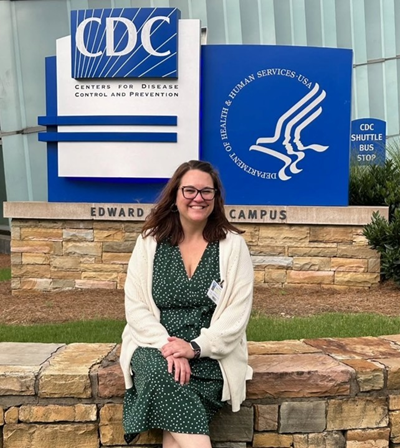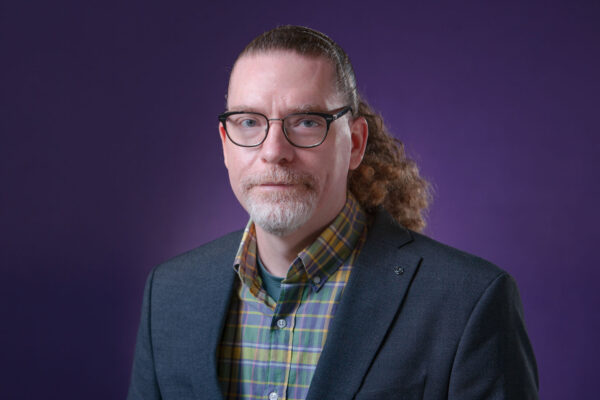The role of educators is to pass their knowledge on to the next generations, yet in many ways educators are also students themselves — lifelong learners devoted to the pursuit of information and experience.
Faculty at the University of Washington Bothell are testament to that fact, dedicated to their research, scholarship and creative practice as well as their teaching.
For Dr. Stefanie Iverson Cabral, associate teaching professor in the School of Nursing & Health Studies, the search for opportunities to grow her knowledge and advance her teaching led her to something of a mecca in her field: the Centers for Disease Control and Prevention.
During the 2024-25 academic year, Iverson Cabral was selected as a science ambassador fellow for the CDC. This experience brought her to the center’s headquarters in Atlanta and then back to UW Bothell where she has since implemented what she learned into her own courses.
An infectious drive to teach
Growing up, Iverson Cabral caught the teaching bug at a young age from her mother, who worked in early education. Education was always a priority, she said.
“In college, I enjoyed what I was learning a lot, but I also really enjoyed watching some of my professors deliver lectures and how excited they would get,” she said. “I thought that if I could be a teacher, I could keep learning but then also get other people excited about learning, too.
“I get so much more out of inspiring the next group, and I get to be an expert in more than just one protein or bacteria.”
Iverson Cabral completed her bachelor’s in Microbiology at California Polytechnic State University before moving to Seattle to attend her parents’ alma mater: the University of Washington. There, she completed her doctorate in Pathobiology. She then served as a post-doctoral fellow for UW’s Center for AIDS & STD. She has since taught at several Seattle-area colleges and universities and has worked as a research scientist in an infectious disease laboratory associated with Harborview Medical Center since 2012.
In 2015, Iverson Cabral joined the faculty at UW Bothell — drawn in particular to the school’s Health Studies program.
“Teaching was always sort of my end game,” she said. “The Health Studies program seemed like the perfect fit for combining the public health aspect with the more basic bench science in the classroom.”
A science camp for adults
Iverson Cabral currently teaches courses in microbiology, infectious disease and global health. It was while she was looking for resources for her Intro to Epidemiology course that she came across the CDC’s fellowship program. She applied and was thrilled when she was selected.

The fellowship kicked off in July 2024 when Iverson Cabral and the other fellows spent a week together at the CDC’s headquarters. She toured the David J. Sencer CDC Museum, the CDC’s Emergency Operations Center and the Biosafety Level-4 lab training facility, where the highest level of biological contaminants, such as Ebola, are studied. With the COVID-19 pandemic still fresh in her mind, she said the experience was especially impactful.
Even more memorable, she said, was the time she spent connecting with fellow educators as they explored ways to integrate public health and epidemiology into STEM education.
“As someone who is in public health and knows a lot about infectious disease, I don’t think I necessarily appreciated how hard the last five years have been on me,” she said. “It refilled my bucket to see all of these things that we teach about and to be with other people who are passionate about the same things that I am.”
Throughout the week, she learned about various teaching resources, and the group worked together to brainstorm strategies for active learning. The fellows also collaborated with the epidemic intelligence service officers to complete an outbreak exercise.
After the week in Atlanta, the fellowship work continued. Over the course of the academic year, Iverson Cabral collaborated remotely with a team of fellows from the West Coast to work on a case study of their own — about a traumatic brain injury — and how to incorporate it into their curriculum.
A case study for all learners
Her fellow team members encompassed educators of all ages — early to higher education — so the case study and learning materials had to be adaptable for all learners. They each also approached the subject from different areas of expertise, from the physics of an injury and visualizing the movement that happens inside the brain to prevention.
Iverson Cabral was able to pilot a section of the case study in her Community Health Promotion & Communication course in the spring 2025 quarter. The course focused on health literacy and effective public health messaging. Early in the course, students evaluated various health communications, such as social media campaigns and flyers, which Iverson Cabral tied back to the case study with resources for parents on traumatic brain injury in sports.
The students discussed methods of prevention, such as helmets, but also what some of the barriers to prevention might be. As in many of her classes, Iverson Cabral felt it was important to weave in the social determinants of health as it related to the case study as well.
“Despite going through 10 years of college, I didn’t learn the term ‘social determinants of health’ until I started working here at UW Bothell,” she said. “Thinking about my own gaps in my education, in every space where I teach the basic science aspects, I also try to fold in the public health stuff because none of it exists in a vacuum.”
While a helmet can prevent a traumatic brain injury, she noted, it also costs money and not everyone has access to or the knowledge about why it is important. The same is true for other areas of preventative health, such as vaccines, she added.
“I think it’s important to take a holistic approach so that students can go out into the world and see things from different angles.”
Dr. Stefanie Iverson Cabral, associate teaching professor, School of Nursing & Health Studies
A well-rounded education
Importantly, incorporating public health aspects such as social determinants into her curriculum presents students with a range of possible health sector careers, Iverson Cabral said.
Many students with an interest in health enter their undergraduate programs thinking that becoming a doctor or other practitioner is the only option. By broadening the scope of her classes beyond the hard science, she aims to showcase to students all the options that are available to them.
Iverson Cabral said she plans to continue incorporating the case study exercise in future courses.
“My goal at the end of the day is try and create more well-rounded students,” she said. “I think it’s important to take a holistic approach so that students can go out into the world and see things from different angles.”
Dr. Stefanie Iverson Cabral received UW Bothell’s Distinguished Teaching Award in 2022.



